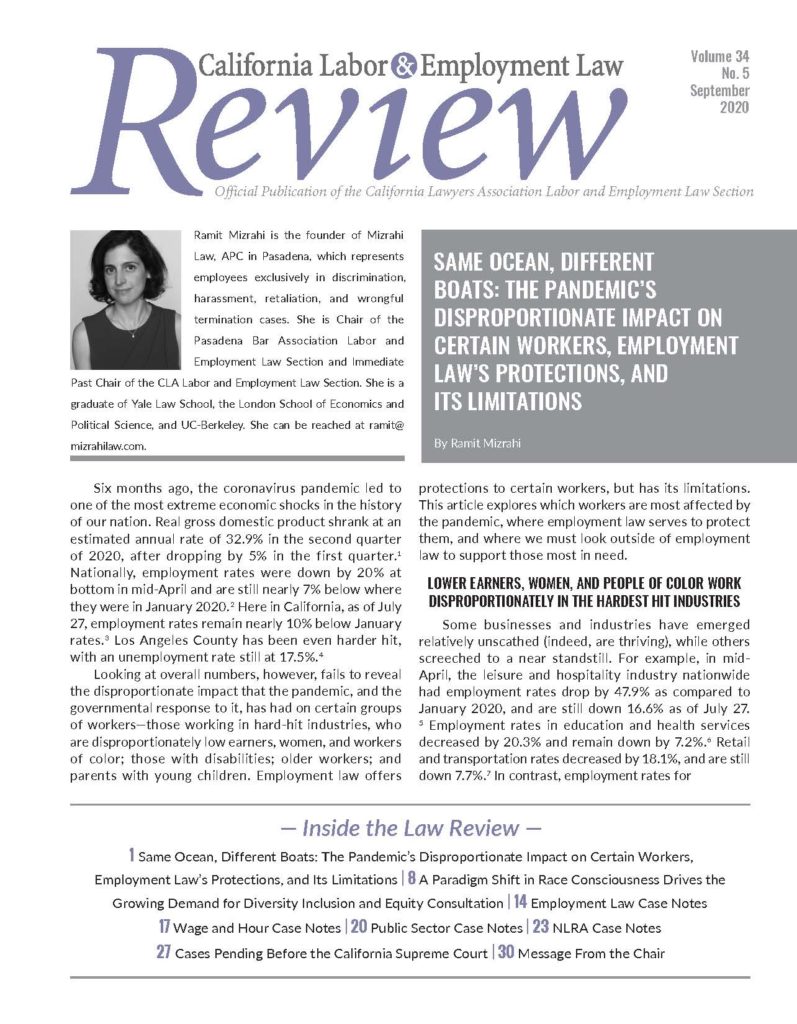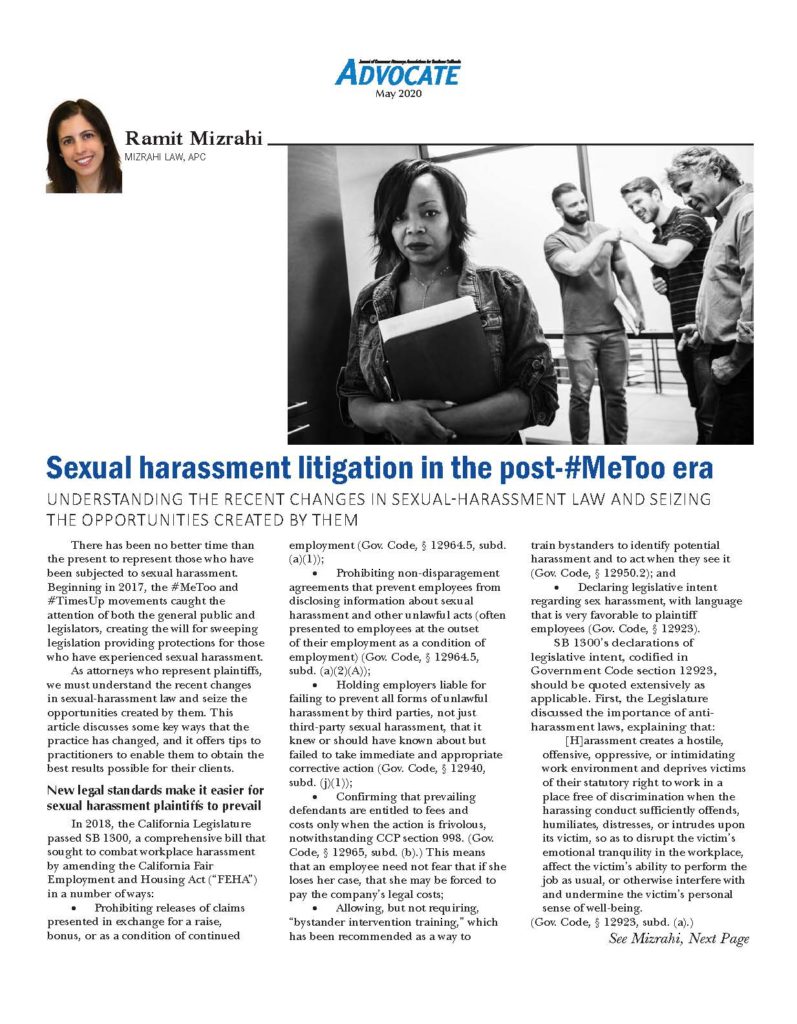-
04 Oct '20

2020 has turned out to be another bumper year for employment legislation. The pandemic provided the impetus for the California legislature to expand family and medical leave to employees at smaller companies, fill in gaps with respect to supplemental paid sick leave, and enact a number of measures aimed at keeping employees safer at work. The California legislature also provided greater whistleblower protections, expanded employer reporting obligations, clarified the law with respect to employee misclassification, and expanded the Labor Commissioner’s powers. Below, we cover the top employment laws that were signed into law or vetoed this legislative session.
-
The September 2020 issue of the California Labor & Employment Law Review features Ramit Mizrahi’s article, titled “Same Ocean, Different Boats: The Pandemic’s Disproportionate Impact on Certain Workers, Employment Law’s Protections, and Its Limitations.” The article explores which workers have been most affected by the pandemic, where employment law serves to protect them, and where we must look outside of employment law to support those most in need.
Click on the below image to read the article in full.
-

UPDATE: On March 19, 2021, SB 95 was signed into law, which provided COVID-19 supplemental paid sick leave (SPSL) for certain covered employees who were unable to work due to COVID-19, including due to quarantine requirements. SB 95 was applied retroactively to January 1, 2021 and was in place until September 30, 2021.
Last week, on September 9, Governor Newsom signed AB-1867 into law. AB-1867, effective immediately, makes sure that all California employees are eligible for COVID-19-related supplemental paid sick leave (“SPSL”) by filling in the gaps lefts by the federal Families First Coronavirus Response Act (“FFCRA”). The FFCRA provides for 2 weeks of COVID-19-related paid sick leave for eligible employees. However, it only applies to employers with fewer than 500 employees. It further allows employers of certain health care providers or emergency responders to elect to exempt them from FFCRA protections. In fact, it is estimated that the FFCRA leaves out up to 80% of the workforce.
-

On September 25, 2020, Ramit Mizrahi will be speaking about recent California employment law legislation at the California Lawyers Association’s 2020 Virtual Annual Meeting.
Here are the details:
California Employment Law Legislative Update
Description: From a sea change in the legality of contract labor requirements to special issues around remote working and the need for workplace safety in the COVID-19 pandemic, 2020 has shaped up to be an exciting year for employment law. Our panelists will provide employee and management-side perspectives on the newly passed California employment laws and other developments, and the impact they will have on workplaces, including an update on the ever-changing landscape of AB-5 changes to contract labor requirements.
-

Update: Governor Newsom signed SB-1383 into law on September 17, 2020.On August 31, 2020, two minutes before the end of the 2019–2020 legislative session, the California Legislature passed Senate Bill 1383. SB 1383, if signed into law by Governor Gavin Newsom, will be a game-changer for the millions of California workers working for small employers who will become eligible for job-protected family and medical leave under the California Family Rights Act (“CFRA”).
SB 1383 does two main things:
- It expands CFRA coverage to all employers with five or more employees, down from 50.
- It allows CFRA leave to be used to provide care for grandparents, grandchildren, siblings, domestic partners, adult children, and children of domestic partners.
We expect that Governor Gavin Newsom will sign the bill into law given his commitment to expanding paid family leave.
This blog post discusses the changes to the CFRA created by SB 1383.
-

Ramit Mizrahi has been recognized in U.S News & World Report’s 2021 Edition of The Best Lawyers in America© for her work in employment law representing individuals.
Ms. Mizrahi has also been selected to the 2021 Southern California Super Lawyers® list, again for her work in employment law representing individuals.
Both honors reflect peer recognition of excellence in practice.
This marks the ninth year that Ms. Mizrahi has been recognized by Super Lawyers®, including having previously been distinguished as being among the top 100 Rising Stars and top 50 Rising Stars women for three consecutive years.
Ms. Mizrahi and the Mizrahi Law team remain committed to serving as tenacious advocates for the firm’s clients while working to build collegiality and community in the legal profession.
-
In the below video, Ramit Mizrahi discusses some of the protections that California’s Fair Employment & Housing Act (“FEHA”) and the federal Americans with Disabilities Act (“ADA”) provide to employees with disabilities as they navigate a safe return to the workplace. She discusses reasonable accommodations and the undue hardship standard, and provides examples of how one can approach requesting accommodation in the workplace. The video was created on behalf of the California Lawyers Association on June 4, 2020.
Ms. Mizrahi’s video of her Facebook Live session with Lupus LA provides even more information, including about leave rights and additional protections.
While we hope that you find it helpful, this video is posted for informational purposes only and is not meant to constitute legal advice. Please consult with an attorney for your own situation.
-

Today is a day for the history books, and a day for celebration! In Bostock v. Clayton County, a landmark decision released on June 15, 2020, the United States Supreme Court held that Title VII of the Civil Rights Act of 1964’s prohibition on sex discrimination encompasses discrimination based on sexual orientation and gender identity. In doing so, the Court gave gay and transgender employees throughout the nation workplace protections from discrimination, harassment, and retaliation. The 6-3 opinion, authored by Justice Gorsuch, held that an employer who fires a worker for being gay or transgender violates Title VII, as doing so necessarily discriminates against that person because of sex. In doing so, the Court resolved a split among federal courts as to whether Title VII offered these protections—as some courts had held that employees could be fired for being gay or transgender.
Here in California, our civil rights law, the Fair Employment and Housing Act (“FEHA”), has protected gay and transgender employees from discrimination, harassment, and retaliation for years:
- In 2000, the FEHA was amended to prohibit discrimination based on sexual orientation.
- In 2003, the FEHA was amended to include “gender” in its definition of sex. The definition incorporated by reference then-Penal Code section 422.76, which defined gender as “the victim’s actual sex or the defendant’s perception of the victim’s sex, and includes the defendant’s perception of the victim’s identity, appearance, or behavior, whether or not that identity, appearance or behavior is different from that traditionally associated with the victim’s sex at birth.”
- In 2011, the FEHA was amended to specifically prohibit discrimination and harassment based on “gender,” “gender identity,” and “gender expression.”
I have traced this history and written before about why workplace protections are so important for gay and transgender employees. Now, workers throughout the nation will be protected.
Two of the three plaintiffs in these cases, Aimee Stephens and Donald Zarda, did not live to see this day—a poignant reminder that while we may not see the benefits of some of our work, we do it as much for future generations as for ourselves.
-
30 May '20
In the below video, taken from a Facebook Live session with the Lupus LA community on May 29, 2020, Ramit Mizrahi discusses the rights and protections that employees with disabilities have with respect to workplace accommodations and medical leave.
While we hope that you find it helpful, this video is posted for informational purposes only and is not meant to constitute legal advice. Please consult with an attorney for your own situation.
-
The May 2020 issue of Advocate Magazine features an article authored by Ramit Mizrahi.
The article — “Sexual harassment litigation in the post-#MeToo era” — discusses recent changes in sexual harassment law in California and the opportunities created by them. Click on the below image to read the article in full.


